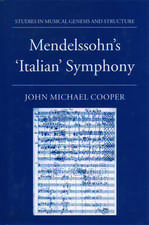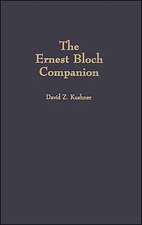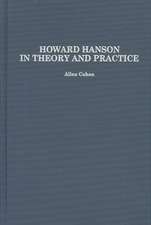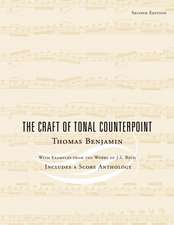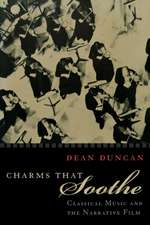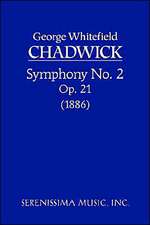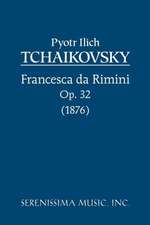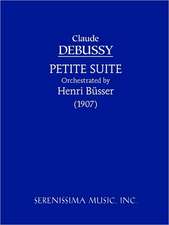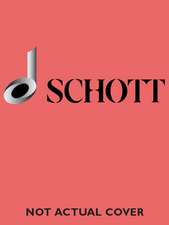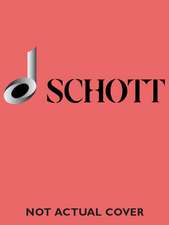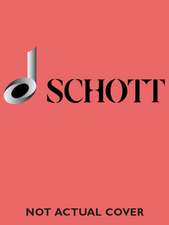The Well–Tempered Announcer – A Pronunciation Guide to Classical Music
Autor Robert Fradkinen Limba Engleză Paperback – 21 iun 1996
Preț: 269.23 lei
Nou
Puncte Express: 404
Preț estimativ în valută:
51.52€ • 53.72$ • 42.82£
51.52€ • 53.72$ • 42.82£
Carte tipărită la comandă
Livrare economică 21 martie-04 aprilie
Preluare comenzi: 021 569.72.76
Specificații
ISBN-13: 9780253210647
ISBN-10: 025321064X
Pagini: 272
Dimensiuni: 216 x 279 x 15 mm
Greutate: 0.61 kg
Editura: MH – Indiana University Press
ISBN-10: 025321064X
Pagini: 272
Dimensiuni: 216 x 279 x 15 mm
Greutate: 0.61 kg
Editura: MH – Indiana University Press
Textul de pe ultima copertă
Radio announcers have very few resources for learning to pronounce foreign words and names associated with classical music. In this innovative guide, Robert A. Fradkin provides the pronunciation of over 2,000 personal names (identified as composers, conductors, and/or performers), titles of works, and musical terms, including tempo and dynamics indications, genres, and dance forms. Fradkin explains the principles of pronunciation of about two dozen languages and provides clues for identifying the language of a strange word and making an educated guess at its pronunciation. He uses a variety of reader-friendly symbols and look-alikes to convey the sounds. The Well-Tempered Announcer is the ideal text for radio and television classes and the ultimate aid in the broadcasting booth.
Cuprins
Prelude
A Tribute to WFOS-FM
Other Acknowledgments
Overture
Why This Guide?
The Old "Native vs. Anglicized" Controversy
Caveat Dictor
Structure of the Book
Suggestions for Using The Book
Limitations
Movement 1. Transcription and Other Basics
Transcription Conventions
Letter vs. Sound
Options and Alternatives
Which Phonetic Transcription?
Is the Glass Half-Full or Half-Empty?
Sound Symbols
Vowels
Consonants
How to Read the Lists
On Alphabetical Order
What's in a Name?
People and Places
Of Firsts and Lasts
Language, Ethnicity, Religion, and Politics
More on Slash Designations
Movement 2. Alphabetical List
Movement 3. List By Language
Armenian
Bulgarian
Chinese
Czech and the Hacek Languages
(Slovak, Serbo-Croatian, Slovenia, Lithuanian, Latvian)
Note on Last Names
Dutch and Flemish
English
Finnish and Estonian
French
German
Greek
Hungarian
Italian
Japanese
Korean
Latin
Polish
Note on Polish Last Names
Portuguese
Romanian
Russian and Ukrainian
Scandinavian (Danish, Norwegian, Swedish)
Spanish
Five Interludes For Tongue and Larynx
Interlude 1. The Voicing Principle
Two Kinds of Consonants
Interlude 2. Consonants on Paper and in the Mouth
Some Terminology for Types of Sounds
So-called Hard and Soft Consonants
Flap, Catch, Shift
Doubles and Dub Bulls
Consonant Cluster Reprise
Interlude 3. Vowels in "General European" vs. English
Vowels in the Mouth
Other Vowel Sounds
Of Diphthongs and Digraphs
"Long" and "Short"
"Broad" and "Flat"
Shwa
Interlude 4. Stress Management
Interlude 5. Hints on Reading Key Signatures
Movement 4. Letter and Sound in the Languages of Europe and East Asia
General Remark on Accent Marks and Diacritics
Romance Languages
Latin
Italian
Romanian
French
Portuguese
Spanish
Germanic Languages
English
German
Two Notes on Visual Impressions
Note on Names, Letters, and Immigration
Voicing Reprise
Dutch and Flemish
Scandinavian (Danish, Norwegian, Swedish)
Slavic and Baltic Languages
On Language, Religion, and Alphabet
Polish
The Hacek Languages
(Czech, Slovak, Serbo-Croatian, Slovenian; Lithuanian, Latvian)
Russian-Ukrainian-Bulgarian
A Guide to Russian Last and Middle Names
Finno-Ugric and Other European Languages
Finnish, Estonian, Hungarian
From the Ends of Europe
Albanian, Greek
Turkish, Welsh, Irish
East Asian Languages
Japanese and Korean
Japanese Stress and Vowel Skipping
Chinese
CODA
Diacritic Review
Letter-to-Sound Review
South-to-Letter Review
The Palatal Challenge
Finale. Annotated Bibliography
I. Names but no phonetics
II. Names and phonetics
III. General Transcription, Phonetics for Singers, etc.
Indexes
A Tribute to WFOS-FM
Other Acknowledgments
Overture
Why This Guide?
The Old "Native vs. Anglicized" Controversy
Caveat Dictor
Structure of the Book
Suggestions for Using The Book
Limitations
Movement 1. Transcription and Other Basics
Transcription Conventions
Letter vs. Sound
Options and Alternatives
Which Phonetic Transcription?
Is the Glass Half-Full or Half-Empty?
Sound Symbols
Vowels
Consonants
How to Read the Lists
On Alphabetical Order
What's in a Name?
People and Places
Of Firsts and Lasts
Language, Ethnicity, Religion, and Politics
More on Slash Designations
Movement 2. Alphabetical List
Movement 3. List By Language
Armenian
Bulgarian
Chinese
Czech and the Hacek Languages
(Slovak, Serbo-Croatian, Slovenia, Lithuanian, Latvian)
Note on Last Names
Dutch and Flemish
English
Finnish and Estonian
French
German
Greek
Hungarian
Italian
Japanese
Korean
Latin
Polish
Note on Polish Last Names
Portuguese
Romanian
Russian and Ukrainian
Scandinavian (Danish, Norwegian, Swedish)
Spanish
Five Interludes For Tongue and Larynx
Interlude 1. The Voicing Principle
Two Kinds of Consonants
Interlude 2. Consonants on Paper and in the Mouth
Some Terminology for Types of Sounds
So-called Hard and Soft Consonants
Flap, Catch, Shift
Doubles and Dub Bulls
Consonant Cluster Reprise
Interlude 3. Vowels in "General European" vs. English
Vowels in the Mouth
Other Vowel Sounds
Of Diphthongs and Digraphs
"Long" and "Short"
"Broad" and "Flat"
Shwa
Interlude 4. Stress Management
Interlude 5. Hints on Reading Key Signatures
Movement 4. Letter and Sound in the Languages of Europe and East Asia
General Remark on Accent Marks and Diacritics
Romance Languages
Latin
Italian
Romanian
French
Portuguese
Spanish
Germanic Languages
English
German
Two Notes on Visual Impressions
Note on Names, Letters, and Immigration
Voicing Reprise
Dutch and Flemish
Scandinavian (Danish, Norwegian, Swedish)
Slavic and Baltic Languages
On Language, Religion, and Alphabet
Polish
The Hacek Languages
(Czech, Slovak, Serbo-Croatian, Slovenian; Lithuanian, Latvian)
Russian-Ukrainian-Bulgarian
A Guide to Russian Last and Middle Names
Finno-Ugric and Other European Languages
Finnish, Estonian, Hungarian
From the Ends of Europe
Albanian, Greek
Turkish, Welsh, Irish
East Asian Languages
Japanese and Korean
Japanese Stress and Vowel Skipping
Chinese
CODA
Diacritic Review
Letter-to-Sound Review
South-to-Letter Review
The Palatal Challenge
Finale. Annotated Bibliography
I. Names but no phonetics
II. Names and phonetics
III. General Transcription, Phonetics for Singers, etc.
Indexes
Notă biografică
ROBERT A. FRADKIN, Assistant Professor of Hebrew at the University of Maryland, College Park, has also taught Russian and general linguistics. He is author of Stalking the Wild Verb Phrase as well as scholarly articles in his academic fields.

